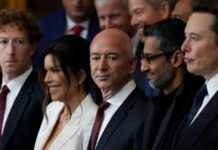Elon Musk: The Billion-Dollar Beneficiary of Federal Aid
Elon Musk, the enigmatic CEO of SpaceX and Tesla, has recently come under scrutiny for receiving a whopping $38 billion in government aid over the past two decades. While Musk has been spearheading mass layoffs and budget cuts within his companies, he has simultaneously been enjoying a windfall of federal funding, according to a detailed investigation by The Washington Post released on February 26.
The Washington Post’s report sheds light on how Musk’s ventures, Tesla and SpaceX, have been major beneficiaries of government subsidies, loans, and contracts, playing a pivotal role in their growth and success. Tesla, for instance, received a substantial $465 million loan from the U.S. Department of Energy in 2010 through the Advanced Technology Vehicles Manufacturing program, which was paid back ahead of schedule in 2013.
One of the key supports for Tesla has been the $7,500 federal tax credit for electric vehicles, although this incentive phased out after the company reached the 200,000-vehicle milestone in 2019. Moreover, Tesla has leveraged state-level incentives for EVs and charging infrastructure, along with revenue generated from selling carbon credits to other automakers to aid in meeting emissions standards.
On the space exploration front, SpaceX has secured billions of dollars in contracts from NASA, including funding under the Commercial Crew Program for manned missions to the International Space Station (ISS) and the Commercial Resupply Services for transporting cargo. The company has also received contracts from the U.S. Department of Defense for launching military satellites and national security missions.
In addition to federal aid, Tesla and SpaceX have both benefited from state tax incentives in regions like California and Texas, fostering innovation and economic growth on a local level. These incentives, as reported, were largely obtained during Joe Biden’s presidency from 2021 to early 2025, providing substantial financial backing to Musk’s enterprises and facilitating technological advancements.
The grants provided to Musk’s companies have not only reduced financial risks but have also accelerated innovation, allowing them to scale up operations, enhance profitability, and maintain a competitive edge in their respective industries. For Tesla, these subsidies have driven the adoption of electric vehicles, while for SpaceX, they have propelled advancements in space exploration, positioning both companies as leaders in their fields.
Despite the significant government support Musk’s companies have received, there is growing concern over Musk’s role as the head of the Department of Government Efficiency (DOGE), which has resulted in budget cuts and layoffs across various federal agencies. The primary objectives of DOGE are to minimize “waste” and enhance government operations, raising questions about the impact of Musk’s leadership on government functions.
In conclusion, while Elon Musk has undeniably benefited from substantial federal aid to fuel the growth of Tesla and SpaceX, the implications of his actions on government operations and employee welfare remain a subject of debate. As Musk continues to navigate the intricate relationship between private enterprise and government support, the ethical and financial considerations surrounding his ventures will undoubtedly continue to be scrutinized by the public and policymakers alike.
Expert Insight:
Vishnu Kaimal, a seasoned journalist with extensive experience in both print and digital media, emphasizes the delicate balance between government support and corporate responsibility. “The intersection of public funding and private enterprise raises important questions about accountability and transparency,” Kaimal notes. “While government aid can drive innovation and economic growth, it also demands a high level of scrutiny to ensure that taxpayer dollars are being used judiciously and ethically.”
With Kaimal’s insight in mind, it is evident that Elon Musk’s billion-dollar federal aid windfall presents a complex tapestry of opportunities and challenges, underscoring the need for ongoing dialogue and oversight to safeguard the public interest while fostering technological progress and economic prosperity.
































